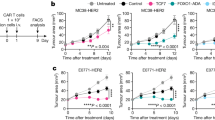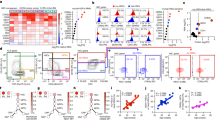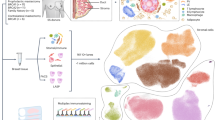Abstract
During the reproductive period, mothers and offspring exchange hematopoietic cells and develop a form of immunological tolerance bidirectionally. To examine whether previous experience of such communication has any remote effect when maternal hematopoietic cells are later transplanted to the children, we retrospectively compared the outcomes of blood and marrow stem cell transplantation from maternal donors (n = 46) to those from paternal donors (n = 50) by using the database of the Japanese nationwide surveys for adult hematopoietic cell transplants between 1990 and 1998. At 5 years, recipients of maternal hematopoietic cells had a significantly higher overall survival than patients receiving paternal grafts (60% vs 32%, P = 0.006). Although no significant difference was observed in the occurrence of severe acute GVHD (grade ⩾III) and the relapse of malignant diseases between two groups, the probability of non-relapse treatment-related mortality was significantly lower after maternal donor transplants. Furthermore, multivariate analysis revealed that parental donor type was the only factor significantly associated with overall survival. In conclusion, our analysis indicates superior survival of maternally donated recipients in hematopoietic stem-cell transplantations from biological parents. This finding has important implications in the selection of alternative familial donors, and warrants further prospective analysis of parental donor transplantations. Bone Marrow Transplantation (2001) 28, 375–380.
This is a preview of subscription content, access via your institution
Access options
Subscribe to this journal
Receive 12 print issues and online access
$259.00 per year
only $21.58 per issue
Buy this article
- Purchase on Springer Link
- Instant access to full article PDF
Prices may be subject to local taxes which are calculated during checkout


Similar content being viewed by others
References
Thomas ED . Bone marrow transplantation for malignant disease J Clin Oncol 1983 1: 517–531
Carella AM, Champlin R, Slavin S et al. Mini-allografts: ongoing trials in human Bone Marrow Transplant 2000 25: 345–350
Henslee-Downey PJ . Mismatched bone marrow transplantation Curr Opin Oncol 1995 7: 115–121
Szydlo R, Goldman JM, Klein JP et al. Results of bone marrow transplants for leukemia using donors other than HLA-identical siblings J Clin Oncol 1997 15: 1767–1777
Aversa F, Tabilio A, Velardi A et al. Treatment of high-risk acute leukemia with T-cell-depleted stem cells from related donors with one fully-mismatched HLA haplotype New Engl J Med 1998 339: 1186–1193
Harris DT, Schumacher MJ, LoCascio J et al. Immunoreactivity of umbilical cord blood and post-partum maternal peripheral blood with regard to HLA-haploidentical transplantation Bone Marrow Transplant 1994 14: 63–68
Claas FHJ, Gijbels Y, van der Velden-de Munck J, van Rood JJ . Induction of B cell unresponsiveness to noninherited maternal HLA antigen during fetal life Science 1988 241: 1815–1817
Bianchi DW, Zickworf GK, Weil GJ et al. Male fetal progenitor cells persist in maternal blood as long as 27 years postpartum Proc Natl Acad Sci USA 1996 93: 705–708
Lo YM, Lo ES, Watson N et al. Two-way traffic between mother and fetus: biologic and clinical implications Blood 1996 88: 4390–4395
Evans PC, Lambert N, Maloney S et al. Long-term fetal microchimerism in peripheral blood mononuclear cell subsets in healthy women and women with scleroderma Blood 1999 93: 2033–2037
Tanaka A, Lindor K, Ansari A, Gershwin ME . Fetal microchimerism in the mother: immunologic implications Liver Transplant 2000 6: 138–143
Burlingham WJ, Grailer AP, Heisey DM et al. The effect of noninherited maternal HLA antigens on the survival of renal transplants from sibling donors New Engl J Med 1998 339: 1657–1664
Neu AM, Stablein DM, Zachary A et al. Effect of parental donor sex on rejection in pediatric renal transplantation: a report of the North American Pediatric Renal Transplantat Cooperative Study Pediatr Transplant 1998 4: 309–312
Matsuo K, Hamajima N, Morishima Y, Harada M . Hospital capacity and post-transplant survival after allogeneic bone marrow transplantation: analysis of data from the Japan Society for Hematopoietic Cell Transplantation Bone Marrow Transplant 2000 26: 1061–1067
Przepiorka D, Weisdorf D, Martin P et al. 1994 consensus conference on acute GVHD grading Bone Marrow Transplant 1995 15: 825–828
Kaplan EL, Meier P . Nonparametric estimation for incomplete observations J Am Stat Assoc 1958 53: 457–481
Cox DR . Regression models and life-tables J Roy Stat Soc Ser B 1972 34: 187–220
Polchi P, Lucarelli G, Galimberti M et al. Haploidentical bone marrow transplantation from mother to child with advanced leukemia Bone Marrow Transplant 1995 16: 529–535
Moretta A, Locatelli F, Mingrat G et al. Characteristics of CTL directed towards non-inherited maternal alloantigens in human cord blood Bone Marrow Transplant 1999 24: 1161–1166
Tsafir A, Brautbar C, Nagler A et al. Alloreactivity of umbilical cord blood mononuclear cells: specific hyporesponse to noninherited maternal antigens Hum Immunol 2000 61: 548–554
Starzl TE, Demetris AJ, Murase N et al. The lost chord: microchimerism and allograft survival Immunol Today 1996 17: 577–584
Ko S, Deiwick A, Jager MD et al. The functional relevance of passenger leukocytes and microchimerism for heart allograft acceptance in the rat Nature Med 1999 5: 1292–1297
Ichinohe T, Matsuo K, Tamaki S et al. Superior outcome of blood and marrow stem-cell transplantations using maternal grafts over transplants using paternal grafts Blood 2000 96: 208a (Abstr. 887)
Acknowledgements
This study was approved by the Committee for Nationwide Survey Data Management in the JSHCT as a working group (WG-2) and was presented in part at the 2000 Annual Meeting of the American Society of Hematology, San Francisco, CA, USA.23 We greatly thank Takashi Uchiyama, Hitoshi Ohno and Hiroh Saji for providing us with substantial advice on the writing of the paper. We also acknowledge all the JSHCT transplantation teams without whom the valuable data presented here would not have been collected.
Author information
Authors and Affiliations
Consortia
Rights and permissions
About this article
Cite this article
Tamaki, S., Ichinohe, T., Matsuo, K. et al. Superior survival of blood and marrow stem cell recipients given maternal grafts over recipients given paternal grafts. Bone Marrow Transplant 28, 375–380 (2001). https://doi.org/10.1038/sj.bmt.1703146
Received:
Accepted:
Published:
Issue Date:
DOI: https://doi.org/10.1038/sj.bmt.1703146
Keywords
This article is cited by
-
Comparison of the clinical outcomes between NIMA-mismatched and NIPA-mismatched haploidentical hematopoietic stem cell transplantation for patients with hematological malignancies
Bone Marrow Transplantation (2021)
-
The European Society for Blood and Marrow Transplantation (EBMT) consensus recommendations for donor selection in haploidentical hematopoietic cell transplantation
Bone Marrow Transplantation (2020)
-
Risk factors for chronic graft-versus-host disease after anti-thymocyte globulin-based haploidentical hematopoietic stem cell transplantation in acute myeloid leukemia
Frontiers of Medicine (2019)
-
Comparison of efficacy between HLA6/6- and HLA3/6-matched haploidentical hematopoietic stem cell transplant in T-cell-replete transplants between parents and children
Science China Life Sciences (2019)
-
Do maternal cells trigger or perpetuate autoimmune diseases in children?
Pediatric Rheumatology (2007)



